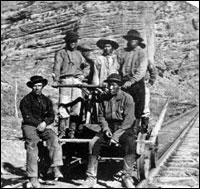
From The Portland Tribune, "Nokes' book breaks the chains of history," by Lori Hall on 16 May 2013 -- When Greg Nokes of West Linn found out that one of his Oregon ancestors was a slave owner he was surprised to say the least.
His relative, Robert Shipley, took his slave, Ruben Shipley, with him, moving from Missouri to Oregon with the promise of releasing Ruben after he helped settle a farm back in 1853.
First, Nokes was not pleased to learn about that component of his family’s history. Second, he was interested to learn there were slaves in Oregon, what was known as a state closed to slavery.
Intrigued, Nokes started researching and writing. The result is his latest book, “Breaking Chains: Slavery on Trial in the Oregon Territory,” which launches May 19.

Research and writing are in Nokes’ blood. His father was an editor for The Oregonian when he was growing up and passed on the love of the written word to Nokes.
“Writing became natural to me,” he said.
After graduating from Willamette University, Nokes started working for the Medford Mail Tribune. From there he went on to 43 years of journalism, working 25 years with The Associated Press and 15 years with The Oregonian.
As a young man, not only did Nokes want to write, but he also wanted to see the world.
“I’ve been fortunate to do both,” said Nokes, who recently turned 76.
Nokes was stationed in New York, San Juan, Buenos Aires and Washington, D.C., while working for the AP. In D.C. he was an economics and diplomatic correspondent. Over the course of his career Nokes visited more than 50 countries before retiring in 2003.
Not one to settle down, Nokes launched a second career by researching and writing his first book, “Massacred for Gold.” It took him 14 years from start to finish to write this nonfiction story about a covered-up 1887 massacre of 34 Chinese gold miners in Hells Canyon. This book resulted in a memorial at Chinese Massacre Cove last year and shined a light on perhaps the largest massacre of Chinese people on American soil.
After finishing that book, Nokes sat down to coffee with his brother, Bill, to discuss book ideas. Bill suggested writing about Ruben Shipley, an element of family history Nokes did not know about.
“In researching his life, I came across other slaves in Oregon,” Nokes said. “This was all new to me.”
In all, Nokes could find 35 names of slaves in Oregon, though he said there were probably up to 100, and “hardly anyone in Oregon knew of this history.”
One family that struck a particular chord with Nokes was the Holmes clan. Slaves Robin and Polly Holmes and their children moved from Missouri to Oregon with their master, Nathaniel Ford, in 1844. They had expected to be freed upon moving to the state closed to slavery.

Like many other settlers, Ford ignored the territory’s laws and forced the Holmeses to work his land. Robin and Polly were finally freed in 1850, but Ford refused to free their three children.
Despite being illiterate and an obvious underdog, Robin Holmes fought back for his children by taking his former master to court.
“He managed to get the ear of some sympathetic attorneys and sued Ford,” Nokes said.
The court battle lasted 15 months, but a judge finally ruled in Holmes’ favor, granting the return of his children.
According to Nokes, Holmes vs. Ford, decided in 1853, is a landmark case in Oregon and the only slavery case ever brought in Oregon courts.
“It’s just another story people in Oregon didn’t know about,” Nokes said.

“Breaking Chains,” however, is more than just the Holmeses’ story. The book explores slavery in general in Oregon and the territory’s questionable laws, including its 1857 Constitution that banned African Americans from moving into the state. That law wasn’t repealed until 1926.
Though Nokes may not be proud of his ancestor, he was happy to learn Ruben Shipley became a successful farmer. And because of his ancestry, Nokes had the opportunity to write “Breaking Chains” in the hopes that Oregonians can learn the complete picture and history of this region and how it formed.
“I hope it will get into schools. I think it will be useful,” Nokes said of the book. “I like to think I contributed to the knowledge of this region’s history. ... The book is more about the history of slave issues in Oregon than just individual slaves.” (source: The Portland Tribune)


golden goose outlet
ReplyDeletehermes
off white
yeezy
palm angels outlet
kyrie 7
air jordan travis scott
curry 6 shoes
off white hoodie
air jordan